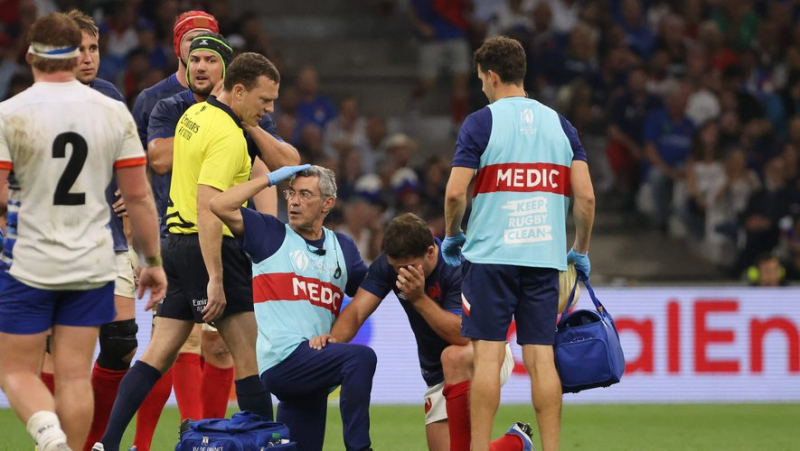Concussions: professional sport on the verge of knockout tries to find solutions

Les commotions cérébrales sont devenu un problème majeur dans le sport professionnel. MAXPPP – LP/Olivier Lejeune
The world of professional sports is becoming increasingly aware of the risks associated with concussions. In Montpellier, the subject focuses energies.
The anecdote could make you smile if it had not had serious consequences. Eight years ago, it was by simply taking a ball to the head that Marie-Alice Yahé had to put an end to her career as a rugby player. But this banal incident of play had dramatic effects on the health of the former Montpellier player. Firstly because it showed that his brain had suffered too many shocks and could no longer withstand them. Then, because she lived through real hell for eight long years, the consequences of prolonged post-concussion syndromes.
Concussions, and their consequences, are among the main risks for professional athletes. A bomb whose effects we can barely measure. In the United States, American football has paid a high price since each year, around fifteen deaths are estimated, mainly as a result of concussions.
"Radically change behavior"
"90% of concussions do not have a knockout, explains Doctor Philippe Malafosse, one of the pioneers in the field of concussion. You have to know how to detect it using signs that are not easy. On the front line, rugby has put in place tools to try to detect them but to date, no treatment exists. Under the leadership, among others, of Doctor Malafosse, consultant physician at the MHR, it is in Montpellier that a work force has been set up around the treatment of concussions. Whether in detection or treatment, several specialists and companies have pooled their knowledge to tackle the problem head-on.
"If we want to treat them, we have to change the rules, summarizes Philippe Malafosse. There is no treatment other than radically changing behavior.
What protocols in sport in France ?
Following rugby, a precursor in terms of concussion protocols, several sports have implemented their system.
In football, "any concussion occurring within the framework of an official LFP match, requires treatment in charge by the team doctor or the doctor of the opposing team or failing that by the field resuscitation doctor, specifies the regulations. The doctor then has three minutes to assess whether or not the player is fit to return to play. An additional substitution for each team is authorized for a concussed player.
Handball has also modified its laws of the game. In fact, any shot in the head of the goalkeeper is punishable by a temporary expulsion of 2 minutes, even a definitive expulsion if it is a shot on a free throw or a throw 7 m. "In the event of suspected concussion in a player, a codified medical examination, adopted by the NHL medical commission, must be systematically carried out by the doctor of the club concerned or, failing that, that of the match" ;, here also specifies the regulations. The federation has also put in place a white card which allows referees to stop the game to call in doctors in the event of suspicion.
In the case of ice hockey, it is simply specified that "any player, with a suspicion of concussion, must be removed from the game, monitored, subjected to a medical examination and not resume activity without medical advice."
"It’is a public health issue. It affects a lot of sports, rugby, football, boxing, horse riding…", insists Patrice Cristofini, general manager of the Montpellier-based company Regenlife.
There is no way to prevent concussions either. In Montpellier, other innovations have been developed. The company K’invent, created in 2017 by Athanase Kollias, biomechanics engineer, develops tools for healthcare professionals. With in particular an electronic platform system which makes it possible to monitor, even remotely, athletes through balance tests.
Visual, salivary or vocal tests
Researcher at the CNRS in Montpellier, Franck Molina and his team are working on a saliva test which makes it possible to detect a possible concussion via proteins released in the body in the event of shock. A process that would allow, in particular, longitudinal monitoring and the detection of concussions that have gone unnoticed or suffered during training. The CNRS is also working on the verbal imprint by observing variations in the voice spectrum.
Finally, another avenue concerns the visual system. "In 90% of cases of concussions, the visual system is disrupted, especially in the muscles responsible for eye movements," explains Philippe Malafosse. By testing with a virtual reality headset developed by the company EyEvo, it is possible to check if the player has regained his abilities, and allow him to resume.
So many initiatives that help move things forward. Rugby was the first to innovate with its concussion protocol, it continues to pave the way in trying to respond to one of the biggest challenges of professional sport in terms of health.
I subscribe to read more




